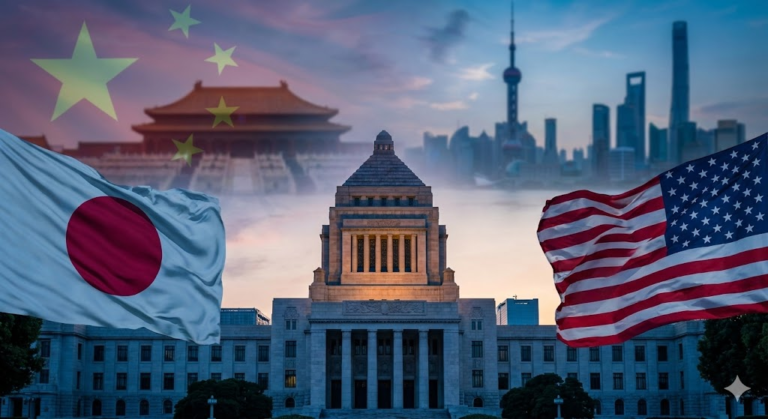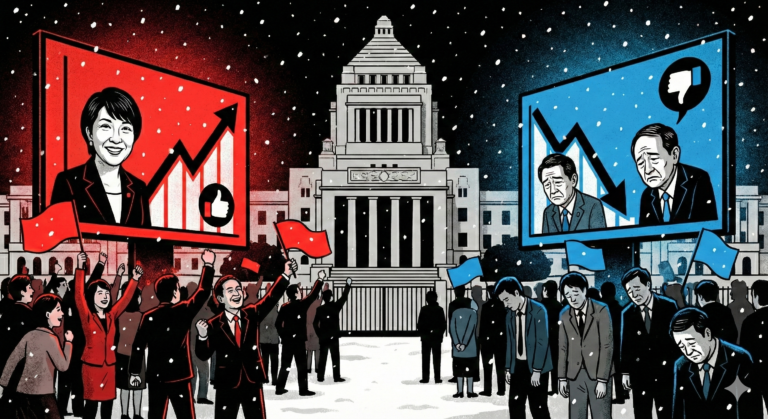ニュース
1985年9月22日に締結された「プラザ合意」から40年が経過した。合意では、日本、米国、英国、フランス、そして当時の西ドイツの5か国が為替市場に共同介入し、ドル安を誘導することで当時巨額の貿易赤字に直面していた米国経済を下支えすることを目指した。
当時の為替当局は、円の対ドルでの上昇幅は10〜15%程度にとどまると見込んでいた。大蔵省国際金融局長を務めた行天豊雄氏も「円高はその程度になると予想していた」と振り返る。
しかし実際には、合意前に1ドル=約240円だった円相場は急激に上昇し、1987年末には130円台を突破した。輸出依存度の高い日本経済にとって急激な円高は大きな打撃となり、国内の輸出企業は深刻な影響を受けた。
日本銀行は景気悪化への対応として、1986年から1987年にかけて5度の利下げを実施し、市場への資金供給を拡大する措置を取った。
補足説明
1985年のプラザ合意は、米国・日本・西ドイツ・フランス・イギリスの主要5か国が協調して、ドル高を是正することを決めた国際合意でした。当時、日本は急成長しており、輸出力の強さがアメリカとの貿易摩擦を引き起こしていました。プラザ合意により円は急速に円高へと進み、日本の輸出企業にとっては大きな打撃となります。
その後、日本政府と日銀は景気の下支えのために金融を大幅に緩和し、余剰資金は株式や不動産に流れ込みました。これがバブル経済を生み出し、1991年の崩壊をきっかけに「失われた30年」と呼ばれる長期停滞へとつながっていきます。
海外の反応
こうした歴史的な流れを背景に、現在のトランプ政権による中国への高関税政策とプラザ合意を重ね合わせる議論も海外SNSで見られます。実際、Redditでは「今の中国は当時の日本と同じではないか」との視点で活発な意見交換が行われていました。
※長文のコメントは要約しています。
Lately I’ve been thinking about US tariffs on Chinese products (up to 254%) and China’s retaliation. It reminded me of the 1980s Plaza Accord, when Japan’s rise led the US to push for yen appreciation, hurting Japanese exports and, some argue, leading to stagnation. Obviously China’s case is more complex (tech, geopolitics, supply chains), but maybe the goal is similar: weaken China’s momentum so the US stays on top. Does this comparison make sense, or am I overthinking?
最近の米国による中国製品への高関税(最大254%)と中国の報復を見て、80年代のプラザ合意を思い出した。当時は日本経済が台頭し、米国は円高を迫って日本の輸出を不利にし、それが停滞につながったとも言われている。もちろん中国のケースは技術や地政学などもっと複雑だが、狙いは「中国の勢いを削いで米国がトップに居続ける」ことではないか。この比較は妥当?それとも考えすぎかな?
We are economists not psychologists stop trying to get us to tell you what Trump really thinks
Stop trying to figure out how Trump is actually playing 5Dchess.
俺たちは経済学者であって心理学者じゃない。トランプが何を考えてるかなんて聞き出そうとするのはやめろ。
「トランプは5次元チェスをやってるんだ」みたいな妄想を探ろうとするな。
The poster isn’t asking about Trump’s mindset but about structural parallels between Japan before the Plaza Accord and China today. Sure, there are similarities, but also big differences: Japan and China differ in scale and ambition. The US had friendly ties with Japan but is adversarial with China. Japan is aging but wealthy, while China still has widespread poverty. China’s surpluses come from low household consumption, not because families save a lot. The CCP would resist reforms like those behind the Plaza Accord.
投稿主が知りたいのはトランプの心理じゃなくて、日本のプラザ合意前と今の中国の状況にある構造的な共通点だと思う。確かに似てるところはあるけど、大きな違いもある。まず規模が違うし、中国は世界的な野心を持っている。アメリカと日本は当時わりと友好的だったけど、中国とは対立的。日本は高齢化で成長は鈍いけど生活水準は高い。一方で中国にはまだ貧困層が多い。中国が大きな貿易黒字を出すのは家庭が貯金好きだからじゃなく、家計に回るGDPの割合が低いから余剰が輸出に回る仕組みになってる。だから共産党はプラザ合意みたいな改革には強く抵抗するだろうね。
I think you are completely right, US wants a Mar-a-Lago accord where Europe, China and the rest of “high surplus” nations agree to appreciate. Miran, the architect, lays it out in a paper. The tariffs are just a way to create negotiating pressure/leverage:
https://www.france24.com/en/live-news/20250416-the-trump-adviser-who-wants-to-rewrite-the-global-financial-system
Now of course given that everyone knows what the effects were on Japan, NOBODY will agree to this, not even at 5000% tariffs…
君の言ってる通りだと思うよ。アメリカは「マールアラーゴ合意」みたいなものを狙ってるんだ。つまり、ヨーロッパや中国、その他の「貿易黒字国」に通貨高を飲ませるってことだ。設計者のミランが論文で説明してるし、関税は交渉のための圧力=レバレッジに過ぎない。
(リンク先のフランス24の記事参照)
でも当然ながら、日本への影響を誰もが知っているから、こんなのに同意する国なんてない。たとえ関税が5000%でもね…。
※「マールアラーゴ合意」とは、トランプ大統領が推進する対中・対外経済政策を、1985年のプラザ合意になぞらえて一部メディアや専門家が呼んでいる言い方
This is truly absurd.
これは本当にバカげてる。
Not sure why I am.getting downvoted for highlighting their plan. I think the “huhuh Trump dumb tariffs'” is dangerously underestimating their agenda.
なんで自分が低評価を食らってるのか分からん。ただ「トランプのアホな関税www」って笑ってるだけだと、本気で彼らの狙いを過小評価して危ないと思うんだが。
Because it isn’t their plan. There is no evidence that’s what they’re persuing.
それは彼らの計画じゃないからだ。そんなものを進めてる証拠はどこにもない。
Except it is literally in the paper that Stephen Miran wrote.
https://www.hudsonbaycapital.com/documents/FG/hudsonbay/research/638199_A_Users_Guide_to_Restructuring_the_Global_Trading_System.pdf
What more evidence do you need than: A. A plan describing what they will do B. The first steps (tariffs) being implemented. It’s like reading Mein Kampf and then saying Hitler had no plan… Now I don’t agree with the plan, I think it will fail spectacularly, but it is still what they are pursuing. Tariffs aren’t just a Trump obsession out of nowhere.
いやいや、スティーブン・ミランが書いた論文にハッキリ書かれてるんだよ。
(Hudson Bay Capital の資料リンク)
A. 具体的な行動計画があること、B. 最初のステップ(関税)がすでに実行されてること、この2つ以上の証拠があるか?
「ヒトラーには計画なんてなかった」って言うために『我が闘争』を読んでるようなもんだろ…。
自分はこの計画に賛成してないし、失敗に終わると思うけど、それでも彼らがやってることだよ。関税はトランプの思いつきじゃなく、明確な戦略の一部なんだ。
Trump has a boatload of economic advisors saying different things to justify the tariffs. Based on what we’re hearing publicly and in reports about negotiations, Trump has never brought up devaluing US currency as an objective. On the other hand, we have 25 years of Trump personally talking about the value of tariffs as an end goal in and of themselves.
トランプの周りには関税を正当化するために好き勝手言う経済アドバイザーが山ほどいる。でも、公に出てる発言や交渉の報道を見る限り、トランプ本人が「米ドルを安くする」なんて言ったことは一度もないんだ。逆に、ここ25年くらいずっと「関税そのものが目的だ」と本人が言い続けてるんだよ。
Not sure denying there’s a plan helps understand the modus. Yes Stephen Miran is one of a bunch, but he and Navarro is very influential “trade czars”. The “Mar-a-lago” accords is not some peripheral concept, it is pretty well reported by financial media if you search it.
Of course Trump never brings it up because he only like “strong” things, as in “dollar strong”. And even mentioning dollar devaluation would wreak havoc in financial markets. The point is not to devalue the dollar, it is to appreciate the currencies of major trade partners, which means dollar isn’t devalued directly but in relative terms towards other currencies (still the same thing). And it isn’t some alien concept as OP points out, it has already been done in the Plaza accords.
「そんな計画なんてない」って否定すること自体が、むしろ理解を妨げてるんじゃないかな。確かにミランはアドバイザーの一人に過ぎないけど、彼やナバロはすごく影響力のある“通商ツァーリ”なんだよ。マールアラーゴ合意ってのは周縁的な妄想じゃなく、金融メディアでも普通に報じられてる。
もちろんトランプは「ドル安」なんて口に出さない。彼は「ドル強し」みたいな“強さ”のイメージが好きだから。ドル安なんて言えば金融市場が大混乱するしね。
要するに狙いはドルを安くするんじゃなく、貿易相手国の通貨を高くさせること。ドルは直接は下がらないけど、相対的に安くなる。それって結局同じことだし、別に新しい発想でもない。OPが言う通り、プラザ合意で一度やったことなんだから。
p2025 has a section on trade (chapter 26, page 765), that outlines tariffs and they should be used and for what purpose. but basically yeh, use tariffs as a means of leverage for favorable deals. guynourpl “tHeRe Is nO pLaN”
p2025(共和党の政策綱領)には貿易についての章(第26章、765ページ)があって、関税の使い方や目的が書かれてるんだ。要するに「関税を交渉のテコに使え」ってこと。だから「計画なんてない」って言うのは的外れだよ。
Yes, that’s what the USA is doing. It’s a largely bipartisan effort. In fairness to Obama, he essentially began the pivot to Asia, sending to Clinton to start the building of a coalition. Biden kept most all of Trump’s initial tariffs and stepped up others, the 100% tariff on EV’s as an example.
America is an empire that generally doesn’t tolerate peer competitors. It’s more Real Politik than Economics. Nuked Japan, firebombed Germany, Scuttled the British and French empires, and then bankrupted and fractured the Soviet Union.
そう、それがアメリカのやってることだ。しかも超党派で進められてる。公平に言えば、オバマが「アジア重視(Pivot to Asia)」を始めたし、ヒラリーを送って同盟を組み始めたのもその一環だった。バイデンもトランプの関税の大半を維持しつつ、一部はさらに強化してる。EVへの100%関税なんてその例だよ。
アメリカは「同等の競争相手」を絶対に許さない帝国なんだ。経済学というより現実政治(リアルポリティーク)。日本に原爆を落とし、ドイツを焼夷弾で焼き、イギリスとフランスの帝国を解体し、ソ連は破産させて分裂させた。
But America never challenges Israel….
でもアメリカはイスラエルには決して挑まないけどな…。
Trump is America. When you ask “what is America really trying to do” there isn’t a separate entity. No one is secretly guiding things.
トランプはイコール「アメリカ」だよ。「アメリカは本当は何を狙ってるのか?」って聞かれても、裏で誰かが操ってるわけじゃない。
Stephen Miran discusses their objectives openly in this video
https://www.youtube.com/live/RMB_OYqV-HE?si=QB1SaeJwnmrElujA
スティーブン・ミラン本人が、この動画で狙いを公然と語ってるぞ。
That may well be the goal, but I think the USA has gravely overestimated it own strength. And if that is the goal It has certainly adopted a bizarre strategy to achieving it; launching a worldwide trade war with pretty much every country on earth isolates the US, not China.
Check out the relative GDP sizes using Purchasing Power Parity rather than using currency exchange rates. China has had the largest economy since 2014, reflecting its domestic market. (See the IMF’s comprehensive historical GDP data for all countries; accessible online) Communist Party of China leadership has long anticipated the decline of the US, the rise of China, and an inevitable clash between the two. (See Pillsbury’s “The Hundred Year Marathon” for some insight). CPC may well have the current scenario all gamed out.
確かにそれが狙いなのかもしれないけど、アメリカは自分の力を過大評価してると思うな。もしそれが本当に目標なら、戦略が完全におかしい。世界中ほぼ全部の国と貿易戦争始めたら、孤立するのはアメリカであって中国じゃないからね。
購買力平価(PPP)でGDPを比較してみろよ。中国は2014年以来、世界最大の経済規模を持ってる。これは内需の大きさを反映してるんだ。(IMFのデータ参照)
それに中国共産党は、アメリカの衰退・中国の台頭・そして米中衝突が避けられないことをずっと想定してきた。ピルズベリーの『百年マラソン』を読むと分かるけど、今の状況もCPCのシナリオ通りかもしれない。
Ppp does not show the size of the economy, but the ability for that economy to meet the basic needs of its citizens.
Nominal is better, but overstated the economies with stronger currencies. The reality is somewhere in between.
PPP(購買力平価)は経済規模そのものを示すんじゃなくて、その国の経済が国民の基本的なニーズをどれだけ満たせるかを示すだけだ。
名目GDPの方がまだマシだけど、こっちは通貨が強い国の経済を実際以上に大きく見せてしまう。真実はその中間くらいだな。
Just to attack an assumption, but it is generally agreed upon that the Plaza Accords effects on Japan are largely overblown and the reason Japan suffered stagnation is mostly to their declining workforce and poor policies.
The Plaza Accords is a lot more complicated than, “America got scared of Japan and hit them a gotcha to stall or hurt the Japanese economy.” Fundamentally, it was an agreement (pushed initially by the French in the G7 Summit of 1982) to deregulate international markets and stop unfair protectionism by all parties involved—including America.
前提をちょっと崩しておくと、プラザ合意が日本に与えた影響は大げさに語られすぎで、日本が停滞した主因は労働人口の減少と政策の失敗だってのが一般的な見方だよ。
「アメリカが日本を恐れて、日本経済を潰すために仕掛けた」みたいな単純な話じゃない。そもそもプラザ合意ってのは、1982年のG7サミットでフランスが言い出したもので、国際市場を自由化して、アメリカを含む全ての国の不公平な保護主義をやめさせるための合意だったんだ。
Just to concentrate on the whole Japan situation at the time, not trying to argue just trying to understand. Its stagnation could be due to ,among other factors, the (asset/financial) bubble popping and lack of proper planning and policy to tackle this. However it’s to my understanding (maybe wrong) that this type of situation had occurred for the first time and the economists didn’t know how to particularly react. Preferring relative stagnation to a recession and unknowns whether after would be a boom or bust. Please correct me if i am wrong or the way of thinking doesn’t really match up.
議論したいわけじゃなくて、当時の日本の状況をちゃんと理解したいだけなんだ。停滞の理由は、資産バブルの崩壊や、その対応策の計画や政策が不十分だったことなんじゃないかと思ってる。けど自分の理解が正しいかは分からない。こういう状況は初めてで、経済学者たちもどう対応していいか分からなかったんじゃないかな。だから「不況になるよりは停滞の方がマシ」って判断をしたのかと。もし間違ってるなら訂正してほしい。
Japan is still a prosperous country, despite slower growth in their GDP. Japan has an aging population, which affects not only total output but also patterns of consumption. Japan ranks fourth in the world in its use of robotics and automation. This is not limited to the production lines, but everywhere from nursing homes and hospitals to food services. They are able to provide the goods and services needed by their population with relatively fewer young people.
GDPの成長は鈍ってるけど、日本はいまだに豊かな国だよ。高齢化が進んでいて、それが生産量だけじゃなく消費のパターンにも影響している。日本はロボットや自動化の導入で世界4位に入るくらいで、それは工場の生産ラインだけじゃなく、介護施設や病院、さらには飲食サービスにまで及んでいる。若い労働力が少なくても、必要なモノやサービスを供給できてるんだ。
It’s possible there’s a hidden plan, but since such goals would be secret, we can’t know right now. The US government’s contradictory statements could mean either strategy or just incompetence. Until internal records come out, we won’t know what was planned, what was bungling, or what was malicious. For now, the fair answer is “I don’t know.” Some think they’re just idiots with no plan, and that might be true, which is scary—but I hope it’s wrong, because if the US economy is run incompetently, it’ll be bad for everyone.
隠された計画がある可能性もあるけど、非公開だから今の時点では分からない。アメリカ政府の矛盾した発言は「戦略」かもしれないし「無能」かもしれない。内部資料が出るまでは確証はなく、今言える公平な答えは「分からない」だ。単にバカで失敗してるだけ、という見方も正しいかもしれないのが怖い。でもそうじゃないと願いたい。なぜなら、アメリカ経済が無能さで動いているなら、世界中にとって悲惨だからだ。
True. I think they have a simplified idea of the world economy and are setting policies without proper insight then you see them flip flop around, policy on Monday – markets crash , Reversal on Tuesday – markets recover to lower level, New unhinged policy Wednesday, and rinse repeat. Actually hilarious if it didn’t affect the stock market and people’s investments.
その通りだと思う。彼らは世界経済を単純化しすぎて見ていて、きちんとした理解なしに政策を出してる感じがする。月曜に政策を打ち出して市場がクラッシュ、火曜に前言撤回して少し回復、水曜にまた無茶な政策で再び混乱…その繰り返し。もし株式市場や人々の投資に影響がなければ笑える話なんだけどね。
考察と分析|プラザ合意から40年、米国の戦略と日中比較
日本が歩んだ道とその教訓
1985年のプラザ合意はドル安・円高を促し、米国の貿易赤字を是正する狙いがありました。結果、日本は急激な円高で輸出競争力を失い、さらに日銀の金融政策の失敗から不動産バブルとその崩壊を経験。「失われた30年」と呼ばれる長期停滞につながりました。
今回のターゲットは中国
現在のトランプ政権が打ち出すのは為替ではなく関税という直接的な手段で、中国を標的にしています。しかも中国は「世界の工場」としてサプライチェーンの要であり、その影響は米中関係にとどまらず世界経済全体に広がります。また日米が同盟国だったのに対し、米中関係は対立的で、中国は一党支配体制を背景に強硬に抵抗できる点も大きな違いです。
世界経済への波及とこれから
プラザ合意後、日本のシェアを韓国や台湾が奪ったように、今回の摩擦でもベトナムやインドなどが「漁夫の利」を得る可能性があります。中国が日本のように長期停滞に陥るのか、逆に産業高度化を進めて力を増すのかは未知数です。ただし共通しているのは、米国が自国の覇権を守るために台頭するライバルを抑え込もうとする構図であり、40年前と今が驚くほど似ているという点です。
今後の展望とまとめ|米中摩擦は第二のプラザ合意になるのか
1985年のプラザ合意から40年、日本は長期停滞という苦い経験を背負いました。いま米国が中国に対して仕掛けている関税政策は、表面的には当時とよく似ています。「米国が経済的に台頭するライバルを抑え込もうとしている」という構図です。
ただし実態は大きく異なります。中国は日本以上に巨大で、しかも世界のサプライチェーンに深く組み込まれています。そのため米中摩擦の影響は、1980年代の日米摩擦よりもはるかに広範囲に及ぶでしょう。さらに中国は一党支配の体制を背景に、米国の圧力に強硬に対抗する姿勢を見せています。
日本の経験を単純に重ね合わせることはできませんが、「覇権国アメリカが台頭するライバルを抑え込もうとする」力学は普遍的です。今回の関税戦争が、中国経済の長期的な停滞につながるのか、それとも逆に産業高度化を促す契機となるのか――その答えはまだ見えていません。
いずれにしても、プラザ合意から40年の歴史は、現在の米中関係を読み解くうえで重要な教訓を示しているのは間違いないでしょう。
それではまた、次の記事でお会いしましょう。
プラザ合意や米中摩擦を理解するためのおすすめ経済書
『1985年の無条件降伏〜プラザ合意とバブル〜』岡本勉 著
本書は、戦後日本の経済史を「1985年」を転換点として描き出した一冊です。太平洋戦争の無条件降伏から始まり、冷戦下での経済復興、そしてプラザ合意による急激な円高と、その後のバブル形成と崩壊までを丁寧に追います。
著者の岡本勉氏は、日本経済がどのように「外圧」と「内政」の狭間で翻弄されてきたのかを浮き彫りにし、なぜ「失われた30年」へとつながっていったのかを多角的に分析しています。単なる経済の数字や事象の羅列ではなく、国際政治や金融の力学も絡めたストーリーとして描かれているのが特徴です。
「プラザ合意が日本をどう変えたのか?」という問いに真正面から向き合いたい人にとって、歴史の流れとその教訓を学べる良質な一冊です。
『世界一わかりやすい 経済の教室』飯田泰之 著
「経済って難しい…」と感じる人にこそおすすめの一冊。GDPやインフレ、金利や為替といった基本から、国際経済や金融政策までを、日常の例え話を交えながら平易に解説しています。特に為替や貿易摩擦といったテーマも扱っているので、プラザ合意や現在の米中摩擦の理解を深めるのに最適です。経済記事を読む前に押さえておくと、ニュースの背景が格段に分かりやすくなるでしょう。
『ゼミナール 経済政策入門』岩田規久男・飯田泰之 著
経済政策の理論と現実をバランスよく学べる教科書的な一冊。財政政策や金融政策、為替制度などを幅広く解説しつつ、現実の経済運営にどう生かされているかを丁寧に説明しています。プラザ合意やその後の日本経済の停滞、そして現代の関税政策との違いを理解する上でも有益です。少し専門的ではありますが、歴史的事例と現代政策をつなげて考えたい読者におすすめです。
参考リンク一覧
- IMF|The Plaza Accord 30 Years Later
- BBC|What was the Plaza Accord?
- Nikkei Asia|Plaza Accord still haunts Japan 35 years on
- FRANCE24|The Trump adviser who wants to rewrite the global financial system
- Reuters|Explainer: What was the Plaza Accord and why does it matter today?



[…] プラザ合意から40年|日本の教訓とトランプ政権の対中関税政策を比較する […]
[…] プラザ合意から40年|日本の教訓とトランプ政権の対中関税政策を比較する […]